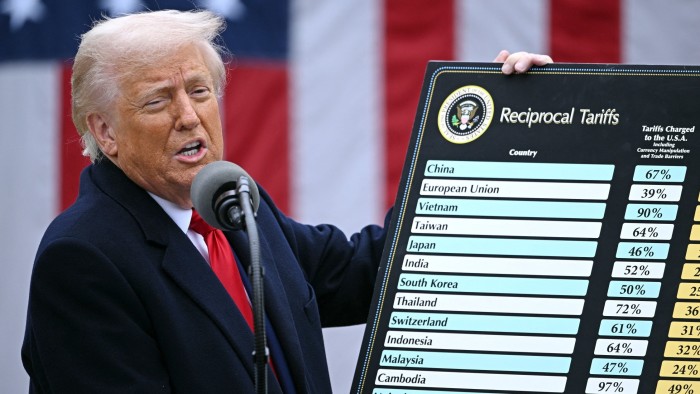Unlock the White House Watch newsletter for free
Your guide to what Trump’s second term means for Washington, business and the world
Businesses, lawmakers and former US officials are pressing the US Supreme Court to rule against Donald Trump’s use of emergency tariff powers ahead of a showpiece hearing this week.
About 40 legal briefs have been filed by groups ranging from the US Chamber of Commerce to former national security officials in opposition to the signature policy the US president has relied on to wage his trade wars.
Trump said on Sunday that he will not attend Wednesday’s hearing, but described it as “one of the most important cases in the history of our country”.
“If a President was not able to quickly and nimbly use the power of Tariffs, we would be defenseless, leading perhaps even to the ruination of our Nation,” he wrote on Truth Social.
His lawyers argue that depriving the president of the authority to impose the tariffs would “thrust America back to the brink of economic catastrophe”.
The Chamber of Commerce, the US’s largest business association, counters that “the irreparable harms already suffered by American businesses large and small underscore the vast economic consequences of the President’s tariffs”.
It says the uncertainty triggered by Trump’s approach is prompting businesses to delay capital investments and consumers to hold off purchasing.
“The ruling is going to be fundamental and foundational for the president’s agenda going forward,” said Everett Eissenstat, a lawyer at Squire Patton Boggs and former Trump economic official. “I guarantee you that law students are going to be reading about this court case for a long time.”
The case could also determine the future of more than $50bn in extra tariff revenue that the US government has collected in 2025, a windfall that has soothed investors nervous about US borrowing levels.
Although the hearing will be held this week, the justices will take at least several weeks to deliberate before issuing a ruling.
Think-tanks lodging legal briefs against the measure include the pro-market Cato and Goldwater institutes.
Law professors and former judges have also lined up against Trump’s use of emergency tariff powers, as have serving lawmakers and former officials from both Democrat and Republican administrations.
Only a handful of briefs — fewer than 10 as of late last week — backed the president.
Jeanne Shaheen, the top Democrat on the Senate Committee on Foreign Relations, said lawmakers hoped to send a “clear statement” to the court.
“These tariffs are not only increasing costs for American families, but they’re also not doing anything to bring back manufacturing jobs we’ve lost,” she told the Financial Times.
While the US constitution gives powers over tariffs and revenue-raising to Congress, it allows the US president to have broad sway over foreign policy decisions.
“Trade agreements are the perfect amalgamation of those two authorities coming together,” said Eissenstat. “It’s a fundamental constitutional question that the country’s been struggling with for 100 or 200 years and more.”
Trump declared the US’s persistent trade deficit a national emergency this year, invoking the International Emergency Economic Powers Act to apply sweeping tariffs on almost all US trading partners.
Two separate lower courts have already ruled that the president does not have the authority to apply tariffs using that statute.
The filing by Trump’s lawyers cites a forecast from the independent Congressional Budget Office that the tariffs imposed using emergency powers will reduce the US deficit by $4tn over the next decade.
“To the president, these cases present a stark choice: with tariffs we are a rich nation, without tariffs we are a poorer nation,” they write.
Although the case could undermine the specific legal basis for Trump’s “reciprocal tariffs”, and the levies imposed to retaliate for fentanyl, it would not affect duties applied to sectors including autos and steel.
Foreign officials and diplomats maintain that the Trump administration will seek to use alternative legal measures to impose tariffs if the use of emergency powers is curtailed by the court.
“We know that the president will maintain tariffs regardless of what the court says,” said Kathleen Claussen, a law professor at Georgetown and former US trade official.
“That’s not to say he would ignore the court . . . It’s just to say that he has many other ways to apply tariffs.”

